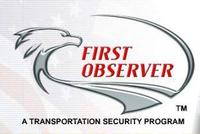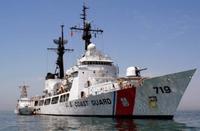-
Iris scanners help passengers zip through airport security
Airline passengers in the United States could soon be zipping through security checkpoints thanks to iris scanners; London’s Gatwick and Qatar’s Doha International airport have already implemented iris scanners from AOptix Technologies, which allow passengers to simply walk through a checkpoint as the scanners can accurately read a person’s iris from as far as eight feet away
-
-
Parking attendants part of U.S. anti-terrorism effort

More than 7,000 parking professionals have been trained in the First Observer parking-specific program developed by the International Parking Institute with the DHS and the Transportation Security Administration
-
-
TSA: Aviation security "stronger and more secure" ten years later
Lisa Farbstein, a spokesperson for the Transportation Security Administration (TSA); discusses new technologies implemented by TSA and DHS and the agency’s shift to a more risk-based approach to passenger screening
-
-
Groups seek FCC ruling on BART’s cell phone shutdown
An ongoing legal battle in California over whether law enforcement agencies can shut off cell phone service could set the precedent for policies across the United States; in response to the Bay Area Rapid Transit’s (BART) decision to shut down its mobile phone service during a planned protest, several digital rights groups are urging the U.S. Federal Communications Commission (FCC) to take swift action
-
-
Germany says "nein" to full-body scanners
Germany has decided against deploying full-body scanners at German airports; after a 10-month trial, in which 1,280,000 passengers were scanned, the government said that the false alarm rate was just too high
-
-
Somali pirates adapt and thrive
Somali pirates have grown bolder and more clever in adapting to world attempts to curtail piracy; last month, they recorded their first hijacking of a ship anchored in port; total costs of piracy now reach $12B
-
-
Judge dismisses parts of lawsuit filed by partially naked man at airport
On Tuesday a federal judge dismissed most of the constitutional claims of a lawsuit filed by a man who was arrested at an airport after he stripped at a security checkpoint in protest of enhanced screening measures
-
-
TSA seeks to reduce workforce to cut costs
In an effort to reduce the size of its workforce the Transportation Security Administration (TSA) is seeking to offer early retirements to its employees
-
-
Poor oversight, cost overruns plague Coast Guard’s modernization efforts

More than $7 billion and ten years later, the U.S. Coast Guard has only built two ships out of its original twenty-five year, $24.2 billion plan to replace its aging fleet with more than 250 new or upgraded vessels; given the service’s procurement track record, Congress is hesitant to continue funding a program plagued by cost overruns, delays, and management problems
-
-
TSA Blackberries vulnerable

The Transportation Security Administration’s (TSA) Blackberry mobile devices are vulnerable to cybersecurity threats due to a backlog of security patches and their configurations; with these vulnerabilities, hackers could exploit unsecured wireless networks to monitor data transmissions, execute denial of service attacks, alter messages, or even impersonate legitimate users to steal sensitive data provided by airline passengers
-
-
Next generation flying: pilots use iPad for navigation

United Airlines pilots will use the iPad to replace the bulky flight manuals and chart books pilots carry with them; the company ordered 11,000 iPads, saying they will save sixteen million sheets of paper a year, and that the lighter load will save 326,000 gallons in fuel. the on
-
-
TSA finalizes air cargo screening mandate
The Transportation Security Administration (TSA) announced on Tuesday that it had implemented the final part of the 9/11 Commission’s requirement for air cargo screening; under Tuesday’s finalized rule, air cargo companies may apply to become a Certified Cargo Screening Facility (CCSF) — CCSFs carry out a TSA-approved security program offsite and transport it to the airport securely without the need for rescreening
-
-
CBP, railroad settles smuggling dispute

Smugglers use trains which go from Mexico to the United States to smuggle drugs and other contraband. In the last few years, the U.S. Customs and Border Protection agency (CBP) has imposed fines totaling millions of dollars on Union Pacific Railroads for carrying the smuggled goods — even though UP maintained it knew nothing about the illegal shipments; CBP and UP have now settled their dispute
-
-
USSI showcases port security system
To help secure U.S. ports and waterways which provide a vital link to the global supply chain, US Seismic Systems Inc. (USSI) has developed an underwater fiber-optic sonar system that detects small craft entering protected areas
-
-
Prez security dome over Martha's Vineyard
On a typical summer day, about 700 small private planes land on Martha’s Vineyard, bringing rich vacationers — mostly from New York City — to what locals call The Rock; not while the president is on the island vacationing, though: The FAA Temporary Flight Restriction is in place over the island for the duration of the president’s vacation
-
More headlines
The long view
New Technology is Keeping the Skies Safe
DHS S&T Baggage, Cargo, and People Screening (BCP) Program develops state-of-the-art screening solutions to help secure airspace, communities, and borders
